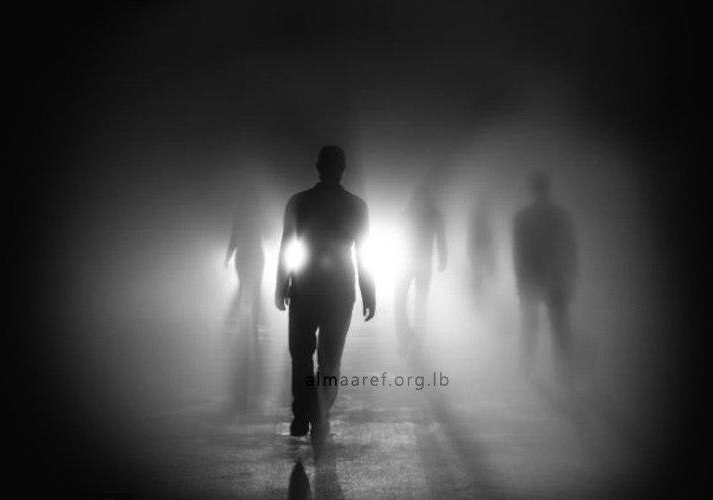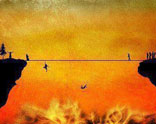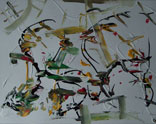No Oppressor Will Escape The Punishment Due To Him
Knowledge of the hereafter
There is a lengthy hadith in Rawza-e-Kaafi. The hadith no.79 is regarding the accounting and melting of justice on the Day of Resurrection. Al Imam Zain Al Abidin (A.S.) is reported to have said: God Almighty says: I am the Only One God. No one except Me is worth worship. I am the Ruler and the Judge Who says nothing against truth. I deal with you on the basis of justice. Today no one will be wronged in My Most Supreme Court. Today I will take from the mighty wrongdoer the compensation of the oppressed weak. I will recollect from the debtor the due debt and will make the payment of one another through exchange of good and bad deeds done by them. Today is the Day on which, from this difficult path, no one can pass from my sight without accounting for the rights which were usurped by him. O people who have gathered in the Grand Field of Mahshar! Catch hold of every concerned oppressor and obtain whatever is due to you. I Myself am the witness against the oppressors.
Repayment Of Dues Of Believers From Deniers And Vice Versa
It is mentioned at the end of the aforesaid hadith that a Quraishi man asked the Imam (A.S.): If some dues are to be paid to a faithful by a denier what will he obtain from the latter who will be in hell?
The Imam (A.S.) replied: A proportionate cut will be made in the sins of the faithful (mo’min) and its punishment (azab) will be added to the chastisement of the denier (Kafir).
The Qureshi inquired: If a Muslim has to obtain his right from another Muslim how will it be retrieved?
The Imam: A proportionate cut will be made in the good deed (reward) of the oppressor and it will be added to the reward of the latter whose dues had remained unpaid.
Qureshi: What if there is no good in the scroll of the oppressor?
Imam (A.S.): A proportionate cut will be made in the sins of the oppressed and its punishment will be added to that of the oppressor.
Cut In Punishment Equal To Right
It must not go unmentioned that if a Kafir has to get from a Muslim, since then, a denier is not qualified to obtain a believer's good, the demand of divine justice will be that a proportionate cut be made in the punishment due to the denier. For a further understanding of this problem please refer to the story of a Jew who had to be paid five Qiraan from a worshiper believer. It has been mentioned in this book earlier.
Fear Of The Claim Of Rights
Al Imam Zain Al Abidin (A.S.) has quoted in Layali-al-Akhbar at p. 548 that on the Day of Resurrection, the hand of a person will be held and raised high so that all could see it. Then it will be announced: If anyone has to take his dues from this person he should come forward and take it. No other thing will be harder than this situation for the people in the field of Mahshar that one's acquaintances should see. He will fear lest they may not claim their unpaid dues from him.
Most Poor In The Day Of Judgment
In the same book, the Holy Prophet (peace be upon him and his household) is reported to have said to his companions: Do you know who is poor? They replied: He among us is poor who does not have any money nor any property or assets. The Holy Prophet replied: In fact, the poor in my Ummah is the one who will bring with him his prayers and fasts and Zakat and Hajj but he had also given a bad name to somebody, had taken someone's property unjustly or had shed somebody's blood wrongly or had beaten someone unlawfully. So all of his good (rewards) will be distributed to the aforesaid claimers in proportion to their usurped rights until all of his good will be finished and yet he will remain indebted. Then the sins (punishments) of the rightful claims will be thrown in the account of the indebted fellow.
Dealing Based On Fazl (Grace)
The person who will be showered with Divine Mercy, will, even though he will remain suspended in the station of people's rights, as he will have to repay some unpaid rights he will be dealt with gracefully. At the time some persons will be drowning in their own perspiration. The Most Merciful Allah will, then show to the gathering a palace of paradise. Then a voice will be heard: “O people! Who claims any right from this one of my servants! Listen. If you desire to dwell in this heavenly palace then, give up your dues and free him.
Truely, a man who behaves straightly with God, his dealing remains straight everywhere. How is it ever possible that God may not straighten it? That is why Imam Sajjad (A.S.) weaps: Waman…meaning: O God! Who except You will save and protect me tomorrow from the claimants of their rights.
Come, lest us all also pray: O Lord! Please deal with us on the basis of Your Grace and Generosity and Kindness: Illahee…Ya Kareem. Hazrat had taught a prayer to Abu Hamzah Shimali in which it is mentioned at many places: Wa Ilaa… Meaning: My God! I beseech Your Grace and Mercy.
The Hauz (Cistern) Of Kausar
Inna Aatainaa Kal Kausar (Surah Kausar 108:1)
One of the Islamic matters about which there is specific mention in the Holy Quran and so also in both Shia and Sunni narrations is Hauz-e-Kausar: “That abundant good which has been granted by the Lord of the Universe to His Messenger Muhammad Mustafa (peace be upon him and his household).
The length of this cistern, as has been earlier mentioned, is equal to the distance from Sanaa (Yemen) to Basra. Cups equal to the number of stars in the sky will be on its bank which will be filled by the hands to sky will be filled with the hands of Hoor Ul Ayn (fairies) and will be served to the Momin (the Faithful). These cups will be of various kinds; some will be made of heavenly silver and some of billor (flint glass).
Hauz-e-Kausar Heavenly Wine — Springs Of Milk And Honey
According to some narrations, this Hauz or cistern will be divided into three parts:
Anhar…Meaning: Heavenly wine, milk and honey will be flowing in streams.
Anyway, it is certain that the contents of this cistern of the Holy Prophet will be sweeter than honey and cooler than ice. Subhanallah (praise be to God). What to talk of the cistern the drinking from which will be very pleasing and after drinking which one will never be thirsty.
Wa Isqana… (Nudbaa Prayer)
Shaykh Shoostari has, in Khasais, and other hadith writers too, have in their works, mentioned that the distributors of Hauz-e-Kausar will be the Holy Prophet (peace be upon him and his household) and the Amirul Momineen (A.S.) and that every mo’min (faithful) will get the Aab-e-Kausar (water of Kausar).
Kausar Becomes Happy With The Mourners Of Husain (A.S.)
The mourners of Husain (A.S.) have one additional distinction with respect to Hauz-e-Kausar. Imam Sadiq (A.S.) says: Inanl Kausar…Husain. The Imam (A.S.) says that the mourners of Husain (A.S.) will on arrival at the Hauz-e-Kausar make the Hauz happy.
For obtaining more details please refer to the first part of the late Khuyabani's book Muharram Wa Waqqaiyal Aiyaam.
The Ears Acquainted With The Heavenly Song
The Holy Prophet (peace be upon him and his household) has said: The Lord of the universe has created a thousand trees around this Hauz. Every tree has three hundred and sixty branches full of leaves and every leaf giver out (releases) different songs. If you want to hear those sweet and pleasing sounds, then you must make your ears worthy of it, that is, you should not lend your ears to worldly music and the nonsense accompanying it.
Appearance Of Muhammad And Aale Muhammad (A.S.)
Sahibe Livaa…
One of the stations of Qiyamat will also be that of the appearance of the grandeur and greatness of Muhammad and the progeny of Muhammad (A.S.).
Livaa-e-hamd means the flag the high spay of which will be equal to the distance covered in a thousand year long journey. There will be three parts in that flag and each one of them will have a length equal to the distance between the east and west. It is mentioned in another narration Aazamu…meaning: Every part of that flag will be bigger than the sun and the moon. On one of them will be written Bismillaahirrahmaanirrahiim and on another second AL Hamdu Lillaah Rabbil Aalameen and on the third Laa Ilaaha Illallaah Muhammadur Rasoolullah.
All the messengers and prophets and pious and righteous people and the faithful will camp beneath that flag the bearer of which will be the conqueror of Khaibar Amirul Momineen Ali bin Abi Talib (A.S.).
The Minber (Pulpit) Of Wasilah (Medium)
Wa Qarrub Ilaihi Waselah
In the aforesaid words of the prayer, 'Wasilah' means that particular pulpit of light which will be established in the field of Mahshar. It will have one thousand staircases and every staircase will be cemented with another by Zamarrud (emerald), Zabarjad (chrysolite), Yaaqoot (ruby) and gold and all these precious things will be from paradise. The top most stair (Arsha-e-Minber) will be reserved for the last Prophet Muhammad (peace be upon him and his household) and the one below it will be for the immediate legatee of the Holy Prophet Janab Amirul Momineen Ali (A.S.) and those lower than them those will be for Ibrahim (A.S.) and other messengers and legatees according to their ranks.
Maqam-e-Mahmood
The Holy Prophet (peace be upon him and his household) will occupy the minber so elegantly and will be initiating the praise of Almighty Allah in such a magnificent way that none of the former and the latters will have ever heard such praising. After the said glorification of the Lord Almighty, the Holy Prophet will say to the angels, the messengers, the righteous people and the faithful: What to talk about the luck whereby the first person of the realm of existence may remember anyone on this high place. O Lord! Place us among this pious group. Read this sentence in the Ziyarat of Ashura: Wa As Alullah… meaning: I beseech of Allah for reaching the Maqam-e-Mahmood (the praised stage) which (O Aale Muhammad!) God has reserved for you.
This high station is the reward of the Holy Prophet's awakening during nights and early rising at dawn: Wa Minal Lail…Mahmooda. (Surah Israa 17:79)
Translation: And do offer prayers in the particular hours of night. This tradition is specially for you in grace. Very soon, your Lord will take you to the Maqam-e-Mahmood.
The Holy Prophet took no rest during nights for ten years till dawn and he worshiped so much that his legs soared.
Ali Bin Abi Talib, The Distributor Of Paradise And Hell
Qaseem Un Naar Wal Jannah
In the said Maqam-e-Mahmood, the most beautiful angel will come to the Holy Prophet (peace be upon him and his household) and salute him and will say: I am Rizwan, the gate keeper of paradise. Then he will submit the keys of paradise to the Holy Prophet. Thereafter a very fear some and ugly angel will approach the Holy Prophet and submit the keys of hell to him. The Holy Prophet will entrust all the keys to the Maulaa-e-Kaainaat Amirul Momineen Ali (A.S.). The Amir (A.S.) will come to the Siraat and only he will go to paradise whom he will permit. Otherwise the leaping flames of hellfire will drag him to Jahannam.
The Holy Prophet will tell Amirul Momineen: O Ali! The obedience hell fire is to you is much more than the obedience of a slave to his master.
Siraat
Wa Innal…La Naakiboon (74:23)
Translation: And doubtlessly those who have no certainty of belief in the Hereafter are deviated from the right path.
Siraat too is one of the things belief in which is obligatory and it is one of the Zurooriyaat-e-Deen (essentials of Faith/religion). So one must have an overall faith in it.
The literal meaning of Siraat is 'Path'! Those people who had remained on the right path, that is, who had not deviated from the right way of truth, honesty and righteousness will, in the Hereafter too, pass securely and safely on the path over hell. Some of them will cross that bridge as swiftly as lightning, some like mounted men and some falling and rising. Briefly speaking, they will cross that bridge-road in the same way in which they had crossed the path of their lives in the world.
* The Hereafter - Ma'ad. Chapter 3. By Ayatullah Dastghaib Shiraazi (q.s.).




















